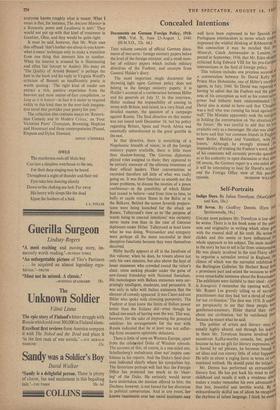Concealed Intentions
Documents on German Foreign Policy, 1918- 1945. Vol. X, June 23-August 1, 1940. (H.M.S.O., 32s. 6d.) THIS volume consists of official German docu- ments of two sorts : foreign ministry papers below the level of the foreign minister, and a small num- ber of military papers which include military directives of the Fuehrer, and excerpts from General Halder's diary.
The most important single document for throwing light upon German policy does not belong to the foreign ministry papers; it is Halder's account of a conversation between Hitler and his generals on July 3t. In this interview, Hitler realised the impossibility of coming to terms with Britain, and raised, in a very frank and detailed manner, the question of a campaign against Russia. The final directive on this matter was not issued until December 18; but his policy regarding Britain, Spain and North Africa was essentially subordinated to the great gamble in the east.
In that directive, there is something of a Napoleonic breadth of vision; in all the foreign ministry papers available, there is little more than shadow-boxing. The German diplomats played roles assigned to them; they appeared to be entirely unaware of the ultimate intentions of their official leaders. Their conversations as recorded therefore tell little of what was really going on. It was their function to smooth out the lesser problems, to discuss the niceties of a peace conference—in the possibility of which Hitler had ceased to believe—and from time to time, to bully or cajole minor States in the Baltic or in the Balkans. Behind the scenes feverish prepara- tions were being launched for the attack on Russia. Talleyrand's view as to 'the purpose of words being to conceal intentions' was certainly never more true than in the case of German diplomats under Hitler. Talleyrand at least knew what he was doing. Weizsaecker and company were perhaps all the more successful in their deceptive functions because they were themselves deceived.
Hitler hardly appears at all in the forefront of this volume; when he does, he towers above not only his own minions, but also above the host of lesser statesmen who crowded round the victor's chair, some seeking plunder under the guise of new-found friendship with National Socialism. His monologues with Balkan statesmen were sur- prisingly intelligent, moderate, and persuasive. It was only in talks with Italian statesmen that the element of comedy appeared. It was Ciano and not Hitler who spoke with clowning pomposity. The Fuehrer at least knew the limits of Italian power better than the Italians did—even though he talked too much of having won the war. This was, however, for the sake of impressing the potential satellites; his arrangements for the war with Russia indicated that he at least was not suffer- ing from excessive optimistic delusions.
There is little of note on Western Europe, apart frdm the celebsated Duke of Windsor episode. The account of this, of course, is a one-sided one. Schellenberg's melodrama does not inspire con- fidence in his reports. And the Duke's final deci- sion indicated clearly where his sympathies lay. The historians perhaps will feel that the Foreign Office has protested too much in its 'clear- ing' of the Duke. He certainly would never have undertaken the mission offered to him; the Duchess, however, is not famed for her discretion in political conversation. And in any event, her known resentment over her social treatment may well have been expressed to her Spanish and Portuguese interlocutors in terms which und0 impressed the wishful thinking of Ribbentrop. 1° this connection it may be recalled that 13° Masaryk, Czech Ambassador in London, re' ported in September, 1936, that Mr. Eden sharPli criticised King Edward VIII for his pro-Gerrnes
interventions in the field of foreign policy. ,
This volume includes one priceless account 01, a conversation between Sir David Kelly an°, Prince Max Hohenlohe, one of Hitler's unollicisi agents, in July, 1940. Sir David was reported es having `to admit that the Fuehrer and the greet' ness of his conception as well as his constructivc power had hitherto been underestimated.' Si:, David also is stated to have said that 'Churchill was a bull who was running his head against the wall.' The Minister apparently took the initiatM in holding the conversation on 'the situation and the future.' He was careful to add that he Was, available only as a messenger. He also was allege', to have said that 'our common friends in England were Butler, Halifax and Vansittart, with Pr lowers.' Although he strongly stressed the impossibility of trusting the Fuehrer's word, malt of his comments will certainly provoke questions as to his authority to open discussion at that tittle' Of course, the German report is a one-sided one' it will be interesting to hear Sir David's accone', and the Foreign Office view of this pecalll






























 Previous page
Previous page